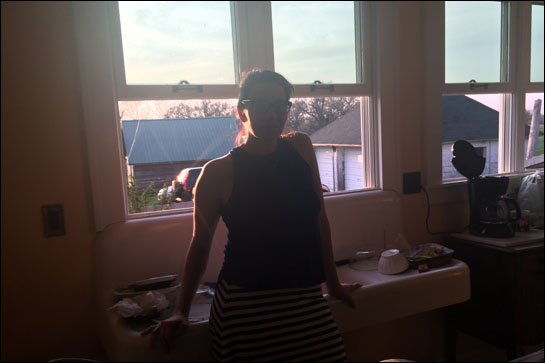Three parenting situations that haunt homeschoolers

Two terrible parenting situations:
Clingy little kids follow you everywhere in the house and want to show you everything, and literally tug on your clothes if you stray.
Obstinate little kids loudly not doing what the teacher tells them to do at home – read a page, tie a shoe, draw a picture, anything that counts as stuff parents need to make kids do for school.
I had those kids. Of course. Those are the kids of every mom who works full-time, but the mom doesn’t realize how awful they are because moms who work full-time are the most likely to say their kids are doing great. I can’t remember where that link is. But I see it in action all the time.
When I took my kids out of school, they saw me all the time, so they didn’t need to be clingy. And they didn’t have to do insane tricks to get the small moments of attention they could only get after school. Most successful homeschool households do self‑directed, optimized learning, which means the kids learn what they want to learn, when they want to learn it, and how they want to learn it, so they avoid fights with parents about what to do next.
There’s no evidence that kids who fight with their parents over schoolwork grow up to be happier people, but there is evidence that kids who feel like they have access to their parents are much easier to deal with, because they’re secure kids. Emotional availability is what scientists call being there for your kids. Parents who are emotionally available are good parents. When I started homeschooling, I realized right away that my kids were easier to parent; school was making my kids artificially difficult and high maintenance.
It took me until my kids were teenagers to understand that I needed to be emotionally available when the kids were home. Being physically present is a beginner level of emotional availability. I had to learn to put down my phone. To listen intently. To be ready to transition from whatever I’m doing to the kids, without lag time. I had to learn to not take naps constantly.
There’s a third terrible parenting situation:
Emotionally unavailable parents pretend to be present but really aren’t; the kids become less adventurous, less curious, less forgiving, because they have to provide emotional support to themselves. Kids can’t do that, so the world feels cold and scary.
I found that the first half of parenting was doing anything to avoid clingy, obstinate little kids. The second half of parenting was longing for those clingy, obstinate little kids who have become smelly, aloof teens. But the constant throughout my adult life has been forcing myself to be emotionally available. It’s not my natural state. I like emotions when I want emotions. I hate the available part. It’s not enough that homeschooling makes kids easier to manage. I need homeschooling to make parents easier to manage.



Great insight. We are on similarly timed trajectories, you and I. I can definitely relate.